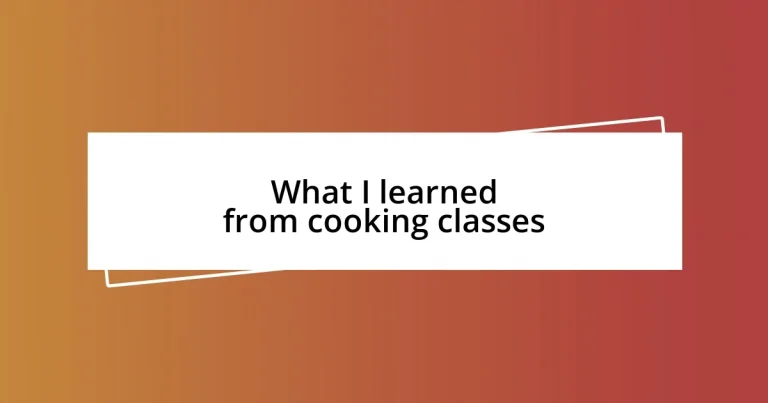Key takeaways:
- Cooking classes foster a sense of community and connection, enhancing both the learning experience and personal relationships through shared culinary passions.
- Hands-on practice cultivates essential skills, such as knife techniques and meal planning, while promoting confidence and creativity in the kitchen.
- Choosing the right cooking class, based on cuisine interest, class size, and instructor style, significantly impacts the overall learning and enjoyment of the culinary journey.
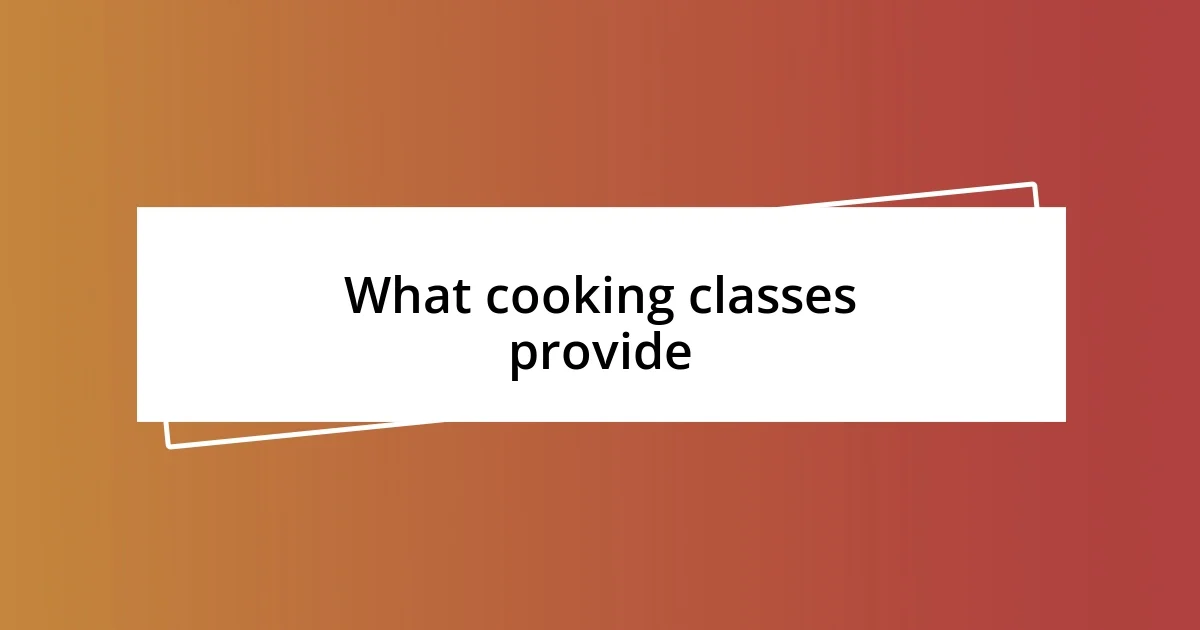
What cooking classes provide
Cooking classes provide more than just recipes; they offer a unique opportunity to connect with food on a deeper level. I remember my first class, where I was introduced to a variety of techniques and ingredients I’d never considered before. It was like unlocking a treasure chest of culinary secrets! Have you ever felt that rush of creativity when trying something new? That initial fear of failure quickly transformed into excitement as I realized I could create dishes I once thought were beyond my reach.
Another valuable aspect of cooking classes is the community they foster. I vividly recall chatting with fellow participants while we diced vegetables and sautéed garlic; it was an atmosphere rich with laughter and camaraderie. Doesn’t it feel wonderful to bond over a shared passion? This sense of connection often extends beyond the kitchen, as friendships bloom over shared meals and culinary adventures.
Lastly, the structured learning environment of cooking classes is a game changer. I appreciated how each lesson built on the last, giving me the confidence to tackle more complex dishes. Have you ever found that when you follow a step-by-step process, you start to feel more like a chef and less like a novice? It’s empowering to see how each skill I mastered helped elevate my cooking, turning mundane meals into gourmet experiences right at home.
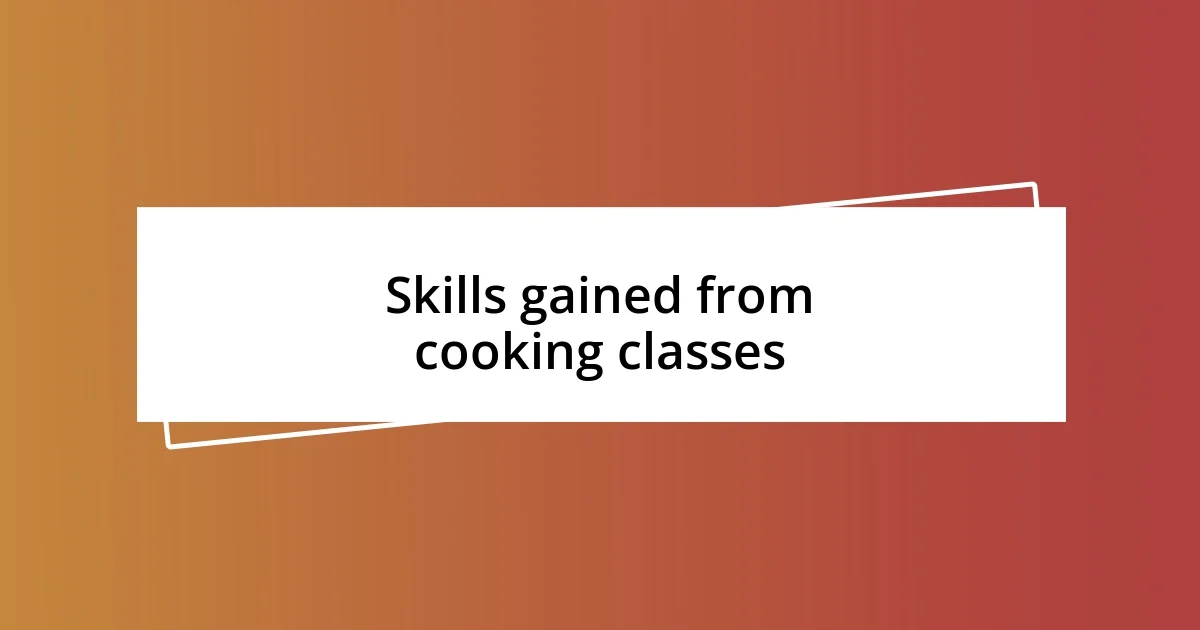
Skills gained from cooking classes
Cooking classes equip you with a variety of essential skills that go beyond just following a recipe. For instance, mastering knife techniques was a significant turning point for me. I remember the first time I julienned vegetables expertly—it felt like an art form. Have you ever noticed how the right technique can elevate not just your dish, but also your confidence in the kitchen? It’s incredible how a simple cut can lead to beautifully presented meals.
Another skill I gained is meal planning. As classes progressed, I learned the importance of balance and flavor profiles. I started experimenting with seasonal ingredients, which transformed my approach to grocery shopping. Was there ever a time you planned a meal and felt proud? I distinctly recall crafting a week’s worth of delicious dinners, feeling accomplished each time I opened my fridge to see fresh produce organized and ready to go.
Additionally, cooking classes helped me develop a deeper appreciation for various cuisines. I fondly remember the day we explored Indian spices; the flavors opened up a whole new world for me. Since then, I’ve incorporated those vibrant flavors into my everyday cooking. Isn’t it fascinating how exploring different cultures through food can broaden our culinary horizons? Each class offered a chance to step outside my usual boundaries and embrace flavors I never knew I loved.
| Skill | Benefit |
|---|---|
| Knife Techniques | Enhanced presentation and safety in the kitchen |
| Meal Planning | Improved organization and variety in weekly meals |
| Cultural Exploration | Broadened flavor palate and culinary creativity |
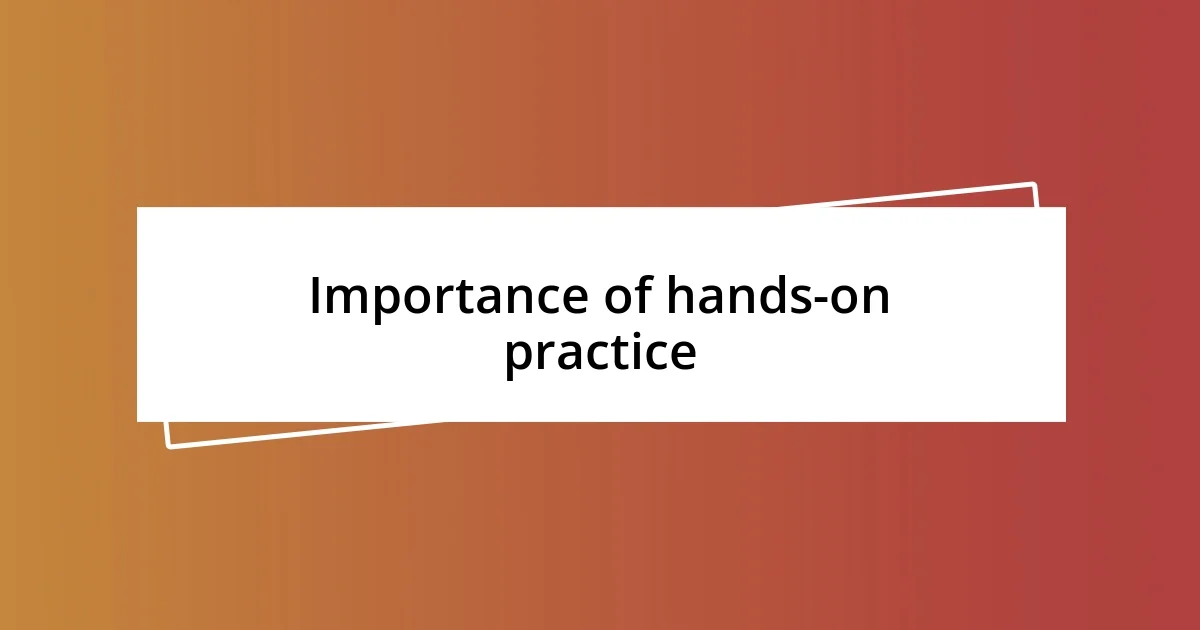
Importance of hands-on practice
Hands-on practice in cooking classes is where the magic really happens. I remember the first time I kneaded dough; my hands were covered in flour, and I could feel the ingredients coming alive under my fingertips. There’s something so grounding about engaging with food directly; it transforms the abstract into reality. This tactile experience not only solidifies the techniques we learn but also deepens our connection to the food we prepare.
- Engaging directly with ingredients helps to develop intuition in cooking.
- Making mistakes in real-time turns them into valuable lessons.
- The sensory experience of cooking enhances flavor and presentation skills.
- My exciting attempts to flip an omelet made it clear that practice truly makes perfect.
When we get involved in the process, it’s like stepping out of the theory and into a vibrant, flavorful world. My first attempt at flambéing was nerve-wracking! The flames shot up, and my heart raced, but the rewarding moment when I tasted the perfectly caramelized dish was exhilarating. It’s these kinds of experiences that cement skills in our minds, teaching us to not just replicate but create with passion and confidence.
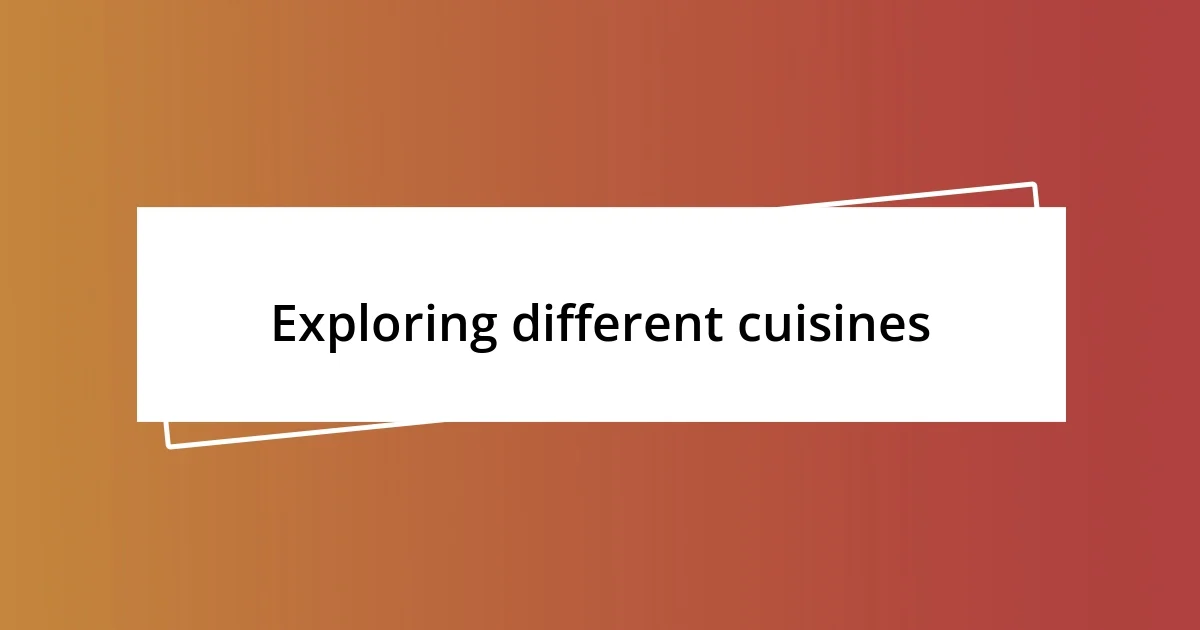
Exploring different cuisines
Exploring different cuisines during cooking classes was like traveling without leaving my kitchen. I can still recall the aroma of fresh basil and garlic as we dove into Italian cooking. Those scents transported me straight to a bustling market in Florence. Have you ever felt an instant connection to a culture through its food? It’s a deeply enriching experience that infuses joy into both the cooking process and the final dish.
One memorable class focused on Thai cuisine, where I learned to balance sweet, salty, sour, and spicy flavors. Palming a jagged piece of ginger, I began to understand how each ingredient plays a critical role in building depth. The thrill of tossing a handful of fresh herbs into the mix felt liberating. I often ask myself if I’d ever discovered such complex flavor layering without these classes. It’s remarkable how a single dish can narrate a culture’s story.
While experimenting with Mexican cuisine, I found myself mesmerized by the vibrant colors of fresh produce. Prepping guacamole with avocados so ripe they practically melted in my hands was a revelation. I remember thinking, “How did I get this lucky?” Authentic ingredients are truly the heart of each cuisine, breathing life into every meal. Each culinary tradition not only tantalizes the taste buds but also weaves together stories of history and heritage that I now cherish in my own cooking.
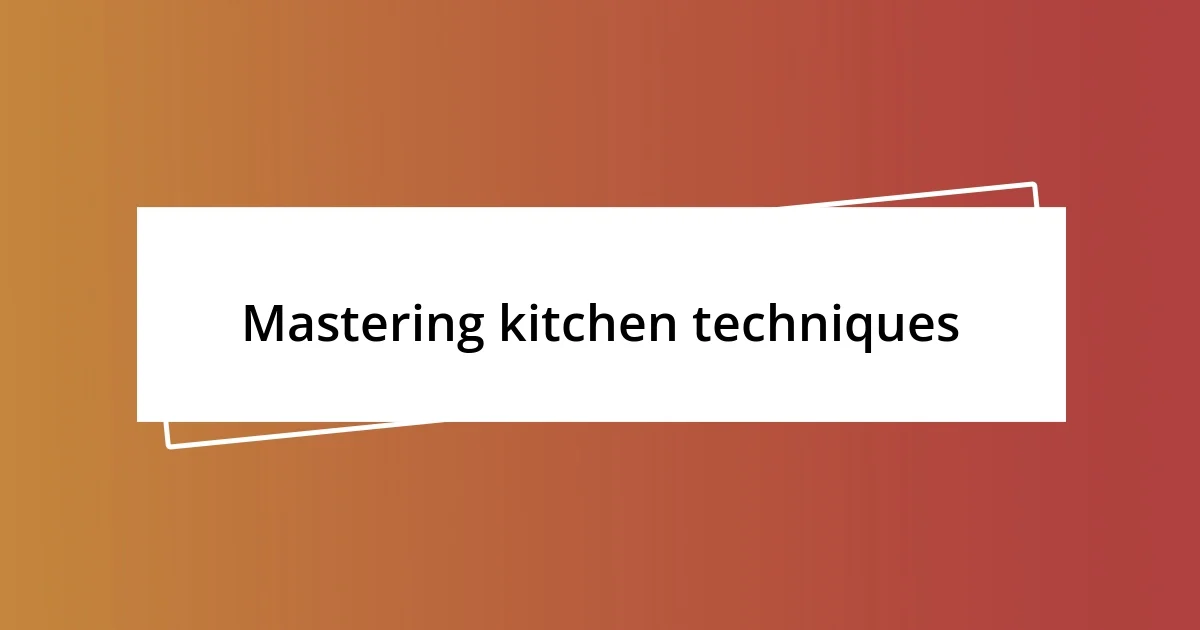
Mastering kitchen techniques
When I first stepped into the kitchen for my cooking classes, I quickly realized that mastering kitchen techniques meant more than simply following a recipe. I’ll never forget the moment I learned the precise way to julienne vegetables. As I sliced through the crisp carrots, I felt a wave of satisfaction—it was like I was sculpting a dish with each cut. How could something as simple as a knife technique bring such joy? It’s in those small details where I discovered my passion for presentation and precision in cooking.
Another technique that stood out was searing meat to perfection. I remember trying to achieve that elusive golden crust, and it took several attempts to get it just right. The sizzle of the meat hitting the hot pan was music to my ears! I wondered, was I overthinking it? But as the aroma filled the air, I realized that cooking is as much about intuition as it is about following steps, and that’s when I began to feel truly confident in my skills.
Learning to properly fold in ingredients was another turning point for me. I struggled at first, thinking it was all about strength. But then my instructor reminded us to be gentle and attentive, which made me feel like a quiet dance partner rather than a clumsy contestant. In that moment, I understood how the delicate balance of technique and care could elevate a dish from average to extraordinary. Isn’t it fascinating how these seemingly minor techniques can transform both the cooking experience and the final outcome?
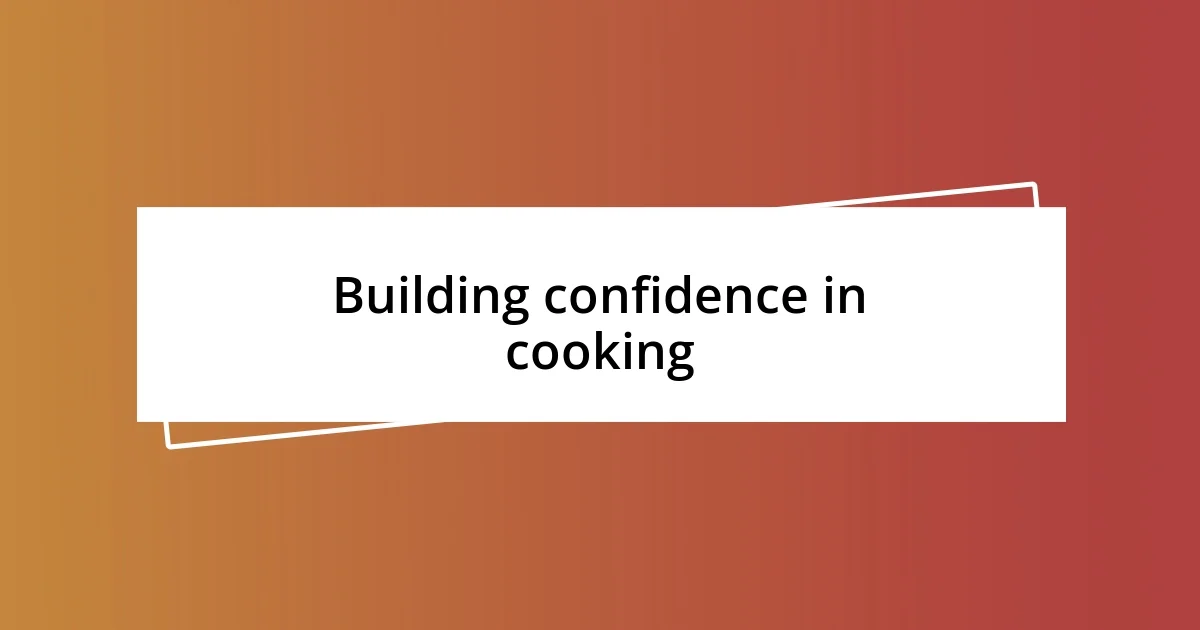
Building confidence in cooking
Building confidence in cooking is a journey I never anticipated. In one of my classes, while attempting to flip an omelet, I completely flopped it—eggs splattered everywhere. At that moment, I felt a mix of embarrassment and frustration, yet my instructor encouraged me to laugh it off. “Every great chef has stories of kitchen disasters,” she said, and those words stuck with me. It’s funny how one small, messy moment can open the door to newfound resilience.
As I continued my lessons, I started to embrace my mistakes rather than shy away from them. I vividly remember my first attempt at baking bread. What should have been a straightforward process turned into a chaotic kitchen experiment, with flour clouds and dough sticking to everything. Yet, when I finally pulled that crusty loaf from the oven, the aroma alone was enough to banish every ounce of doubt. Can you recall a moment where a simple task transformed into something magical? It’s those experiences that truly ignite confidence and joy in the kitchen.
Furthermore, every time I presented a dish I had crafted, whether it was a colorful stir-fry or a delicate soufflé, I noticed a shift within myself. I’d stand back and admire my work, feeling a sense of pride swell in my chest. It wasn’t just about the end product; it was about proving to myself that I was capable. Isn’t it powerful how cooking can become a platform for personal growth? With each class, I gained not just skills, but a deeper belief in my ability to create something beautiful.

Tips for choosing the right class
When searching for the right cooking class, consider what cuisine excites you the most. For instance, I’ve always had a soft spot for Italian food. That love led me to a pasta-making workshop. The hands-on approach of rolling dough and shaping each piece handmade really sparked joy in me. If there’s a specific cuisine that speaks to you, pursuing classes in that area will keep your enthusiasm alive.
Next, think about the class size. I’ve experienced both large and intimate settings, and I can tell you that smaller classes offer a more personal touch. There’s something wonderful about receiving direct feedback from instructors and forming connections with fellow students. In a larger class, you’re more likely to feel like just another face in the crowd. Which environment do you think would help you learn better?
Lastly, review the instructor’s background and teaching style. I once took a class from a chef who was more of a stern taskmaster, which made it hard for me to enjoy the experience. Another instructor I had was warm and encouraging, creating a supportive atmosphere that allowed me to experiment without fear. Wouldn’t you want someone who inspires you? Researching instructors can mean the difference between just learning techniques and truly embracing the art of cooking.












